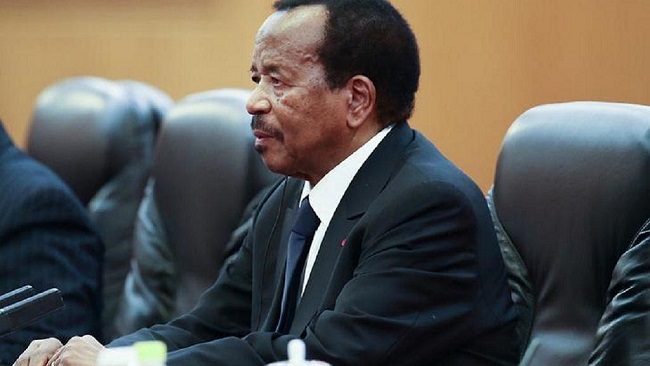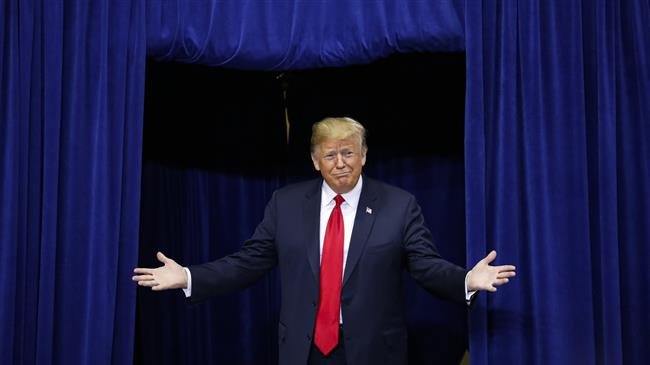7, November 2019
Yaounde Shrug Off US Suspension of Preferential Trade 0
Cameroon has shrugged off U.S. President Donald Trump’s announcement last week to suspend the country’s preferential trade status over alleged human rights abuses by security forces.
Cameroonian economists say U.S. plans to withdraw the central African nation from the African Growth and Opportunity Act (AGOA) beginning Jan. 1, 2020, would have little economic impact as bilateral trade is very low, making it mostly symbolic.
The 2000 law aims to stimulate U.S. trade and investment in sub-Saharan Africa by giving 39 countries duty-free access to the U.S. market.
But participants must work toward a market-based economy, upholding labor standards, establishing the rule of law, and respecting human rights.
University of Yaounde economist Gladys Mebenga said Cameroon can be an economic success without the U.S. trade support.
Cameroon’s export to the U.S. is less than 3 percent of its total exports, she said, adding that petroleum products, which form a majority of Cameroon’s trade exports, are in high demand by many of the 127 countries where Cameroon does business.
Cameroon’s National Institute of Statistics reports that its leading trade partner in 2018 was China, which accounted for 23 percent of exports. The U.S. was in 12th position, importing 2.8 percent of Cameroon’s exported goods.
In a press release issued after Trump’s statement, the U.S. embassy in Yaounde said relations between Cameroon and the U.S. remain strong despite the change in AGOA status.

It said that in 2018, Cameroon exported roughly $220 million in goods and services to the U.S.; $63 million of it under AGOA, over 90 percent of which was crude oil.
Frederrick Ekouda, visiting economic analyst at the Catholic University of Central Africa, said there is little dependence on the U.S. market.
America is not the only destination where Cameroon can sell its petroleum products, he said, adding that Cameroon also has economic partners in Brazil, China, South Korea and Russia.
But while the loss of AGOA status may not have an immediate impact on Cameroon’s economy, it would be a black mark on the country’s record, according to rights groups.
Roger Essoh of the Center for the Protection of People Traumatized by Conflicts (CEPPTC) said that stigma could deter other nations from offering Cameroon such trade deals.
Cameroon willfully committed itself to respect the terms of AGOA, Essoh said, and it is imperative for President Paul Biya to fix the human rights record instead of allowing his country to continue to sink economically.
US accusations
Trump’s message to Congress said despite intensive engagement between the U.S. and Cameroon, Yaounde had failed to address persistent human rights violations by security forces. The allegations included extrajudicial killings, arbitrary and unlawful detention, and torture.
Cameroon’s government has denied frequent accusations of rights abuses in its fight against Anglophone separatists and Boko Haram militants.
Government spokesperson Rene Emmanuel Sadi said U.S. claims of gross violations are unfounded.
Cameroon’s military forces respect all human rights norms, he said, adding that they are restoring order and protecting Cameroon’s territorial integrity and the lives and properties of its people.
But rights groups point out evidence of abuses by both Cameroon’s military and the militants they are fighting.
Cameroon’s five-year fight against Boko Haram insurgents has left more than 27,000 people dead and two million displaced.
Since 2017, Yaounde’s conflict with Anglophone separatists has killed about 3,000 people.
VOA





























22, November 2019
China Is Not In Africa For Charity, But To Control Its Resources 0
Africa is on the cusp of a new period in its history, its renaissance. Freed from centuries of colonialism and neo-imperialism, Africa has the opportunity to become a center of economic might to provide prosperity to the continent’s growing population. Yet, at present, Africa unfortunately faces a new danger: Sino-imperialism, the risk of falling under the control of China largely through Chinese economic investment and loans. The People’s Republic of China has long supported African states since the Chinese Communist Party (CCP) came to power in 1949. Under Mao, China’s backed African liberation movements in an effort to advance Maoism and offset Soviet and American influence. In much of Africa today, China is the imperialist power.
China is in Africa now not to advance Maoism, but to control its resources, people, and potential. From building railways in Kenya and roads in rural Ethiopia to running mines in the Congo, China has drastically changed the African economic landscape in the twentieth century. China lent nearly $125 billion to Africa between 2000 and 2006 and recently pledged $60 billion at the 2018 Forum on China-Africa Co-operation. The Chinese superficially appear to maintain a mutually beneficial relationship with Africa by providing financial and technical assistance to Africa’s pressing developmental needs. Trade between China and Africa has grown from $10 billion in 2000 to $190 billion by 2017. It is estimated that 12 percent of Africa industrial production, or $500 billion annually—nearly half of Africa’s internationally contracted construction market—is carried out by Chinese firms.
China’s activities in the African continent have yet to receive the attention they deserve in the West. China’s behavior in Africa is important for three major reasons. First, China is the source of significant investment capital twinned with a prodigious ability to create infrastructure, both of which are needed by many African states. Second, China’s behavior in Africa provides the rest of the world with insight into how it will behave towards other states, particularly the states of the Global South, as it becomes equal in power with the United States. Third, what China is doing in Africa does not augur well for the rest of the world. China’s activities and behavior in Africa may only be described as neo-colonial and exploitative of African peoples and the environment.
China’s abusive behavior towards African states has occurred for decades. In 2007, Guy Scott, the former agricultural minister in the Zambian government told The Guardian, “We’ve had bad people before. The whites were bad, the Indians were worse, but the Chinese are worst of all.” But Sino-imperialism is getting worse as China grows in power and seeks evermore resources.
There are copious examples of the negative consequences of Sino-imperialism. One archetypical case is the China National Petroleum Corporation, the state-owned oil and gas company, which is a major investor operating in South Sudanese oil fields. The Chinese pollute the local environment with impunity, resulting in children born with deformities, the poisoning of livestock, destruction of fertile land, and the pollution of rivers. Additionally, the Chinese cause environmental destruction in the Northern Upper Nile and Ruweng states affects the indigenous Dinka Padang communities of South Sudan. The Chinese help produce oil generating revenue and economic opportunities but are not bound with environmental standards.
The Chinese influence in South Sudan also results from road construction and infrastructure development. South Sudan will provide thirty thousand barrels per day of crude to the Export-Import Bank of China to fund the construction of roads and infrastructure development. This includes the construction of a 392-kilometer (244-mile) road from Juba to Rumbek and from Juba to Nadapal on the Kenyan border, which is being built by a Chinese firm using Chinese technology and manpower.
South Sudan’s neighbors, Ethiopia and Kenya, received loans for infrastructure projects from the Chinese. The Chinese Belt and Road Initiative has introduced dynamic infrastructure projects such as the Standard Gauge Railway. The railway connects Djibouti, Ethiopia, and Kenya. The railway was Ethiopia’s first railway in over a century and Africa’s first fully electrified line. The railways cuts travel time from the capital Addis Ababa to Djibouti from two days by road to twelve hours.
The Standard Gauge Railway appears to be providing revolutionary infrastructure to stimulate economic growth, but the details demand scrutiny. The project cost nearly $4.5 billion, partly financed by the China Export-Import Bank. The railway uses Chinese trains, Chinese construction companies, Chinese standards and specifications, and operated by the China Railway Group Limited (CREC) and China Civil Engineering Construction Corporation.
As might be expected from this Sino-imperialist project, the railway has been plagued with technical and financial challenges, which calls into question Ethiopia’s dependence on Chinese technology and debt-finance. The African country is struggling to repay its loan to China and reap the benefits of this dynamic infrastructure project. In 2018, Addis Ababa negotiated with China and structured its loan terms from fifteen to thirty years. In next door Kenya, as a result of heavy borrowing by the government, China may seize the port of Mombasa. According to Kenya’s Daily Nation newspaper, the terms are Draconian and state “neither the borrower [Kenya] nor any of its assets is entitled to any right of immunity on the grounds of sovereignty, with respect to its obligations.”
In addition to these abuses, the Chinese presence in Africa is defined by a purposeful isolation from the indigenous population. Chinese firms bring in their own drivers, construction workers, and support staff, denying these employment opportunities to Africans, and often live apart from the African societies in which they reside.
These activities are only an example of China’s abusive behavior in Africa. Africa endured colonialism and neo-imperialism for hundreds of years. Just as Africa has freed itself from those bonds, it needs to work with the West and other states to provide alternatives to Chinese money and infrastructure. The greatest threat Africa faces today is Sino-imperialism. It is now in danger of being captured by China’s sinister Sino-imperialism that will keep Africa from entering its renaissance.
Source: The National Interest